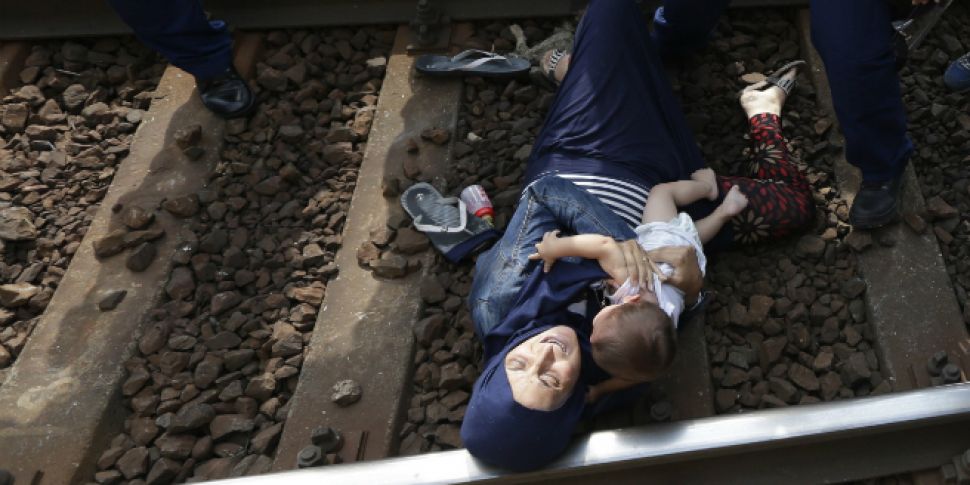Desperate refugees hoping to reach western Europe have been forced off a train by riot police in Hungary, as authorities try to take them to a holding camp instead.
The train, which earlier left Budapest's main railway station, was halted in Bicske, where there is a refugee reception centre.
Refugees, most of them from Syria, banged on train windows from the outside and shouted "No camp, no camp", while dozens of riot police looked on.
Dozens more lay on the tracks in protest against being taken to the camp, while others caught in the underpass pushed back dozens of riot police blocking the stairs to fight their way back to the train.
Those still in the carriages are demanding water as they sit at the station in the heat.
Hungarian police have declared the area an "operation zone" and have told all media there to leave. They are using batons to push reporters out of the station.
Earlier on Thursday, thousands of desperate refugees and migrants poured into Keleti railway station after it was reopened, forcing their way onto a train despite announcements that there was no service to western Europe.
They pushed into the carriages and tried to cram their children through open windows.

Image: Petr David Josek / AP/Press Association Images
The train that left Keleti, the first in two days after authorities closed the terminal on Tuesday, was initially thought to be heading to Sopron, a town near the Austrian border.
Hundreds more refugees and migrants remain at Keleti, and are waiting on crowded platforms for the next available trains.
An Austrian police spokesman said there are no services running from Budapest to Vienna, while the Hungarian government said no international trains will be leaving Keleti for "safety reasons".
Keleti had been closed for two days, but people poured into the terminal on Thursday as police withdrew. Thousands had slept outside waiting for the station to reopen.
European response
Amid the chaos, Hungarian Prime Minister Viktor Orban said his country had done everything to stick to EU rules on border protection, and revealed the army will be deployed to defend Hungary's border with Serbia.
More than 150,000 migrants and refugees have travelled this year to Hungary, a gateway to the EU for those crossing by land from nations including Syria and Afghanistan, across Macedonia and Serbia.
Mr Orban, meeting European Union leaders in Brussels to discuss the crisis, said other politicians should not criticise his country for "doing what is compulsory to be done".
He said: "The problem is not a European problem. The problem is a German problem.
"Nobody would like to stay in Hungary… all of them would like to go to Germany. So if the German Chancellor insists on it, Hungary must register them."
Berlin has agreed to take in some 800,000 people from Syria and the Middle East.
Angela Merkel, the German Chancellor, said the influx "is a problem that concerns us all in Europe" and added her country is doing what is morally necessary.
French President Francois Hollande said he and Ms Merkel are putting forward a series of measures to deal with the migration crisis.
Mr Hollande said this would include a "permanent and obligatory mechanism" by which refugees, "notably Syrian", would be distributed among the 28 countries in the EU.
These will be submitted to a meeting of European interior ministers on 14 September.
Last weekend, Hungary had allowed refugees to travel by train to western Europe without going through asylum procedures.
Trainloads of people arrived in Austria and Germany from Hungary on Monday as asylum rules collapsed under the strain of a wave of migration unprecedented in the EU.
However, Budapest's stance has since hardened, as demonstrated by the Keleti closure and plans to deploy the military to the border.









